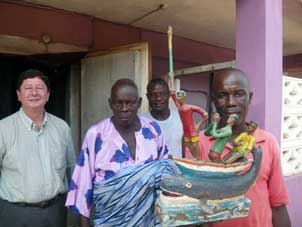
The United States Agency for International Development (USAID) has awarded a $24 million grant to the Coastal Resources Center (CRC) at the University of Rhode Island’s Graduate School of Oceanography to lead a five-year sustainable fisheries project in Ghana, West Africa. The grant is the largest in URI history.
The objective of the USAID/Ghana Sustainable Fisheries Management Project is to rebuild key marine fisheries stocks through responsible fishing practices.

“This will be a very challenging and ambitious project. If successful, our work with the Ghana Ministry of Fisheries and Aquaculture Development will reverse the trend in declining fish catches,” said Brian Crawford, who will move to Accra, Ghana to lead the project for URI. “With improved management, tens of thousands of metric tons of high-quality, low-cost fish protein supply can be recovered, benefiting not only tens of thousands of fishermen and women processors, but improving food security for millions of people in Ghana and its neighbors in West Africa.”
The project is part of USAID’s Feed the Future Initiative and will meet the government of Ghana’s fisheries development objectives. Working closely with the Ministry of Fisheries and Aquaculture Development and the Ghana Fisheries Commission, the project seeks to end overfishing of stocks important to local food security. It will accomplish this by working to ensure a legal framework exists for adoption of management plans that give use rights to the fishermen/women; ensuring decisions affecting fisheries and ecosystems are based on strong science; and widely communicating knowledge and information that educates the public and policy makers, so that support for lasting change emerges.
More than 100,000 men and women involved in the local fishing industry are expected to benefit from this project. Included will be tens of thousands of women involved in the processing and marketing of smoked fish.
“We are very proud of CRC and its outstanding record of outreach and education,” said Bruce Corliss, dean of the Graduate School of Oceanography. “The center does outstanding work on coastal policy and planning, both in Rhode Island and abroad, and this award demonstrates the confidence USAID has in CRC’s performance and its international leadership in this field.”
In leading this project, CRC will work with a consortium of international and local partners, including SNV Netherlands Development Organization, SSG Advisors, Hen Mpoano, Friends of the Nation, the Central & Western Fish Mongers Improvement Association in Ghana, Daasgift Quality Foundation, Development Action Association, and Spatial Solutions.
Included in project activities will be efforts to reduce child labor and trafficking in the fisheries sector in the Central Region of Ghana. The project also includes a university strengthening component with the University of Cape Coast to improve their applied research and extension services in coastal and fisheries management.


